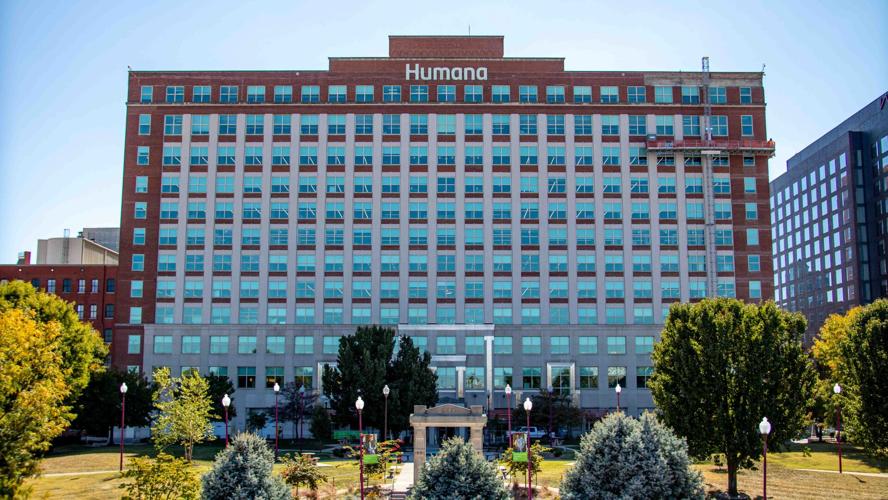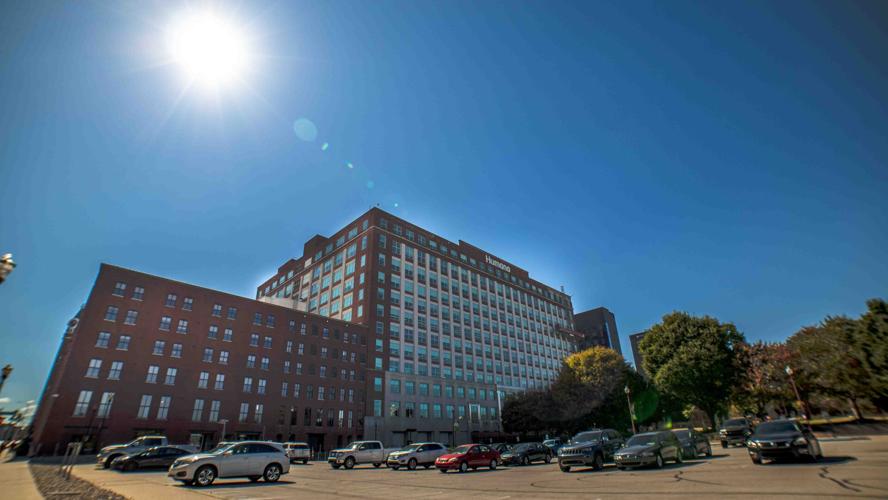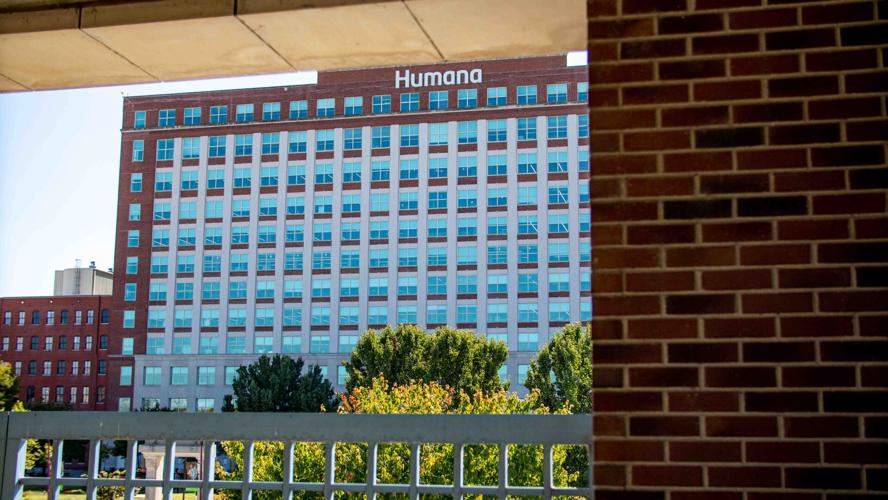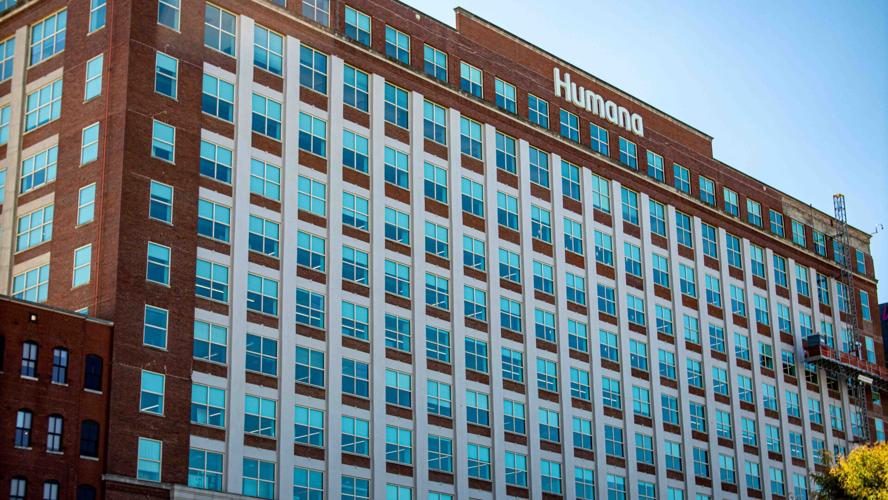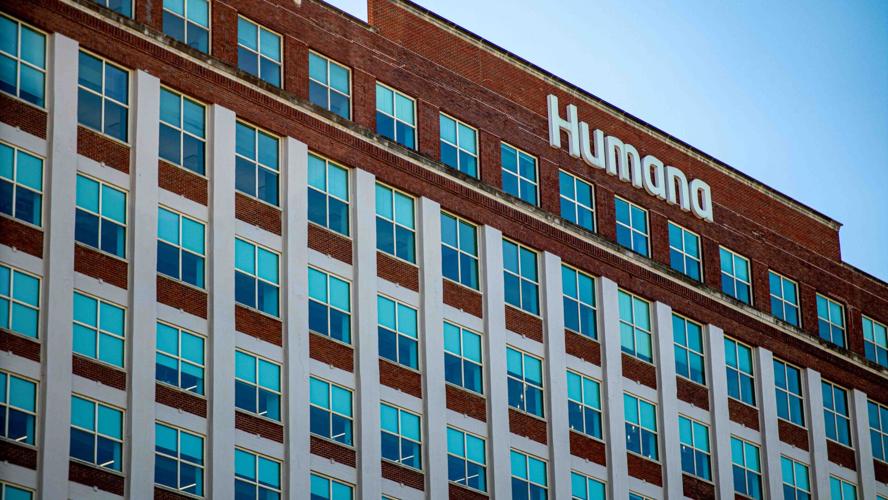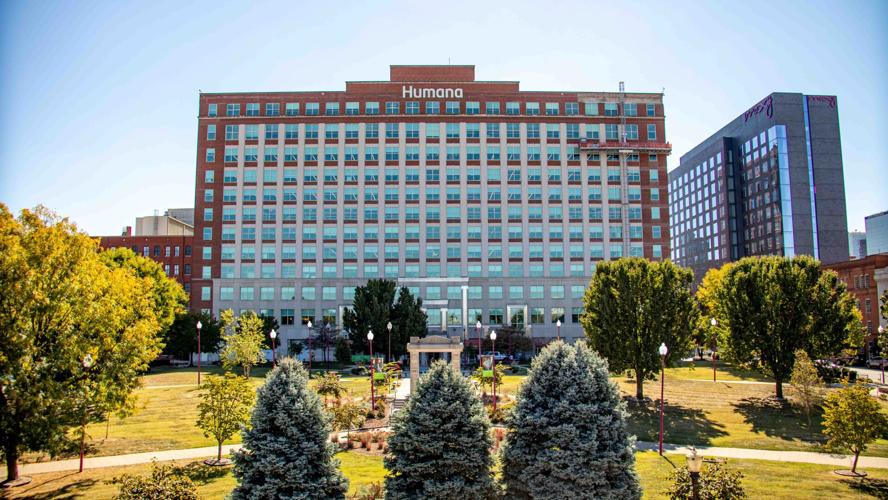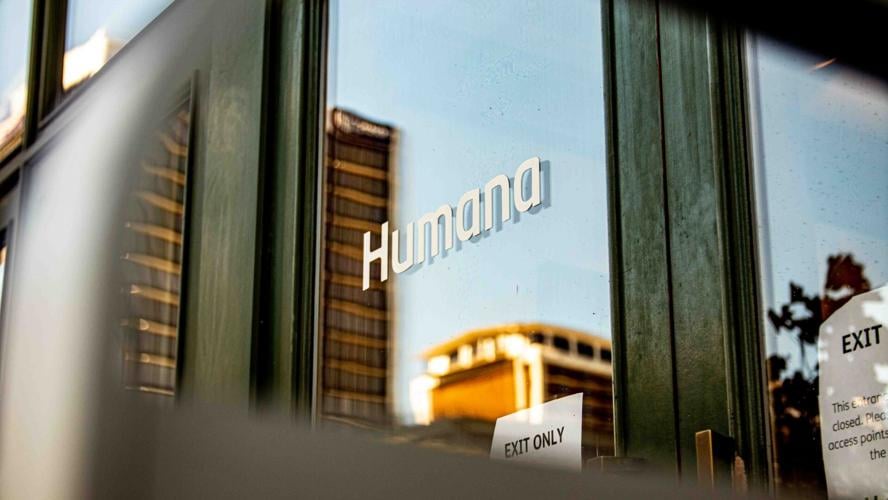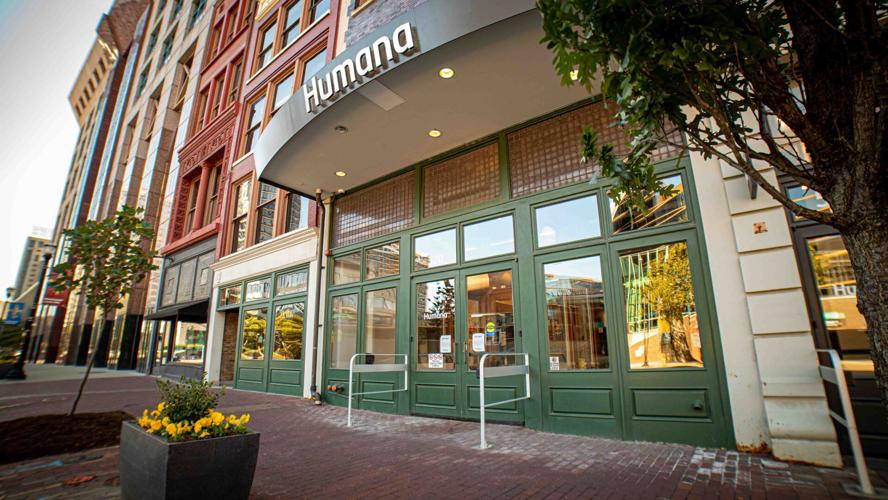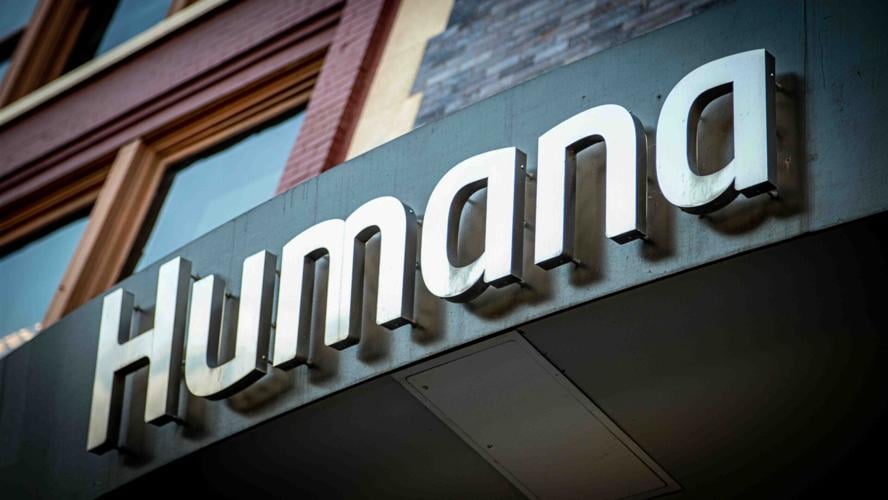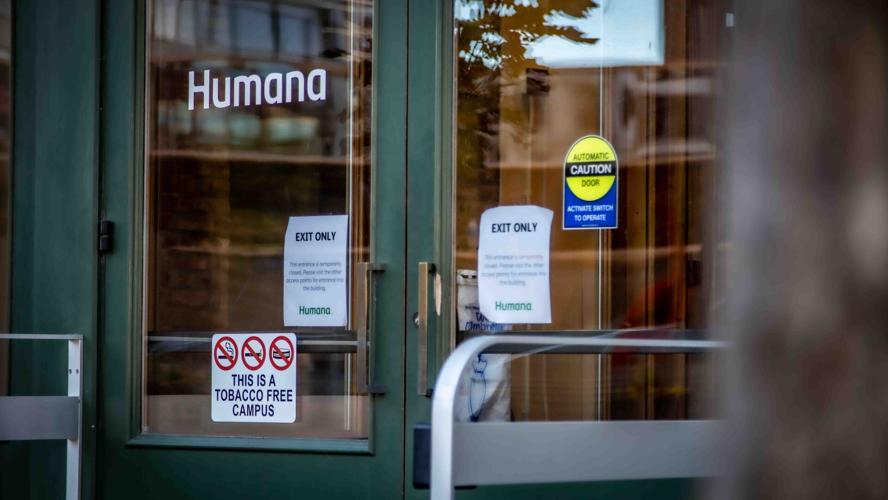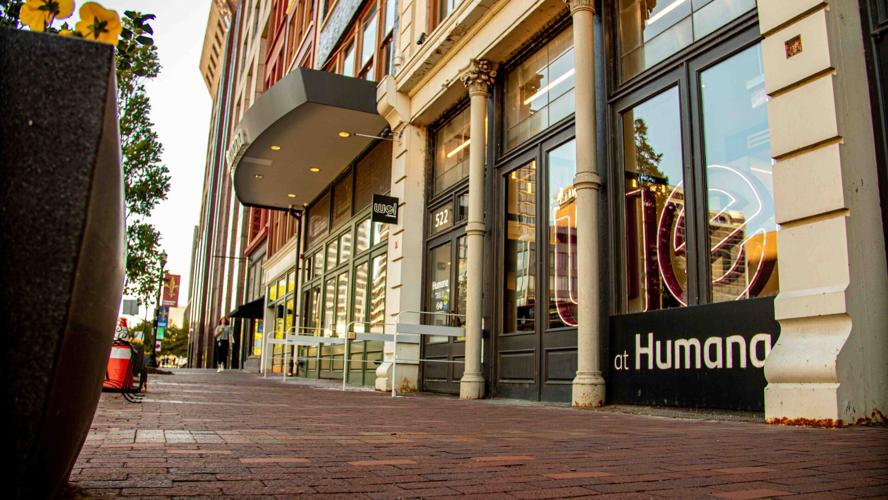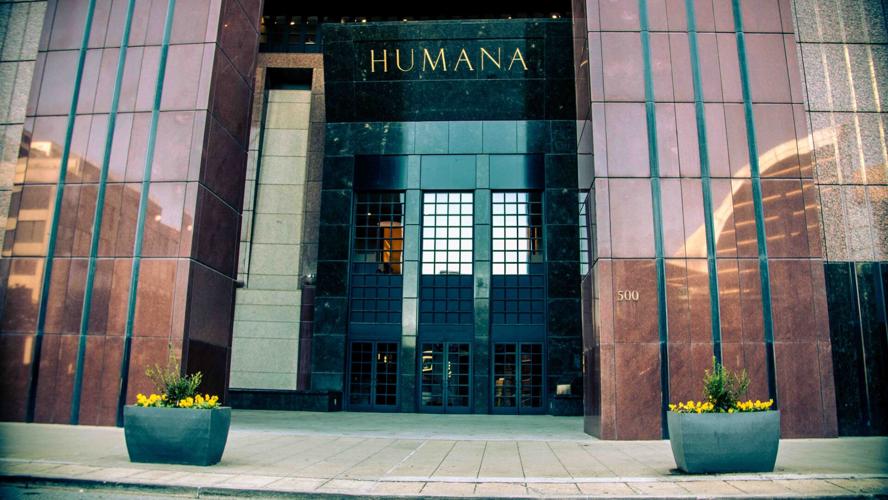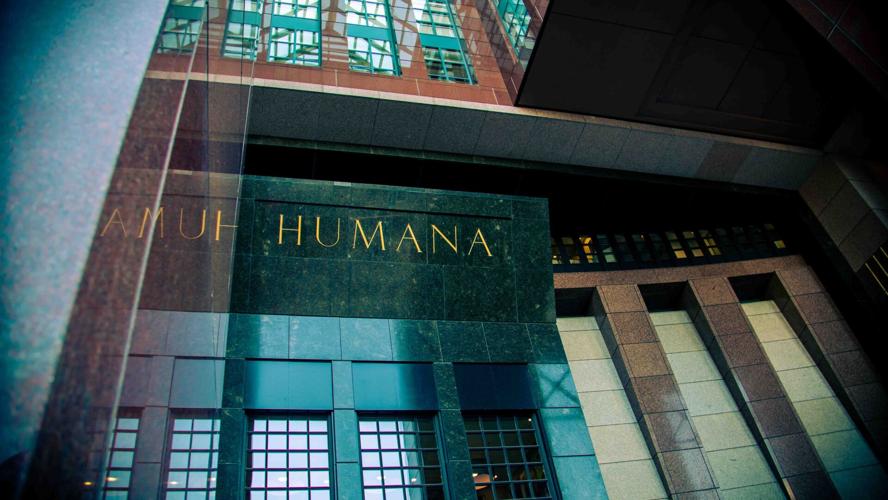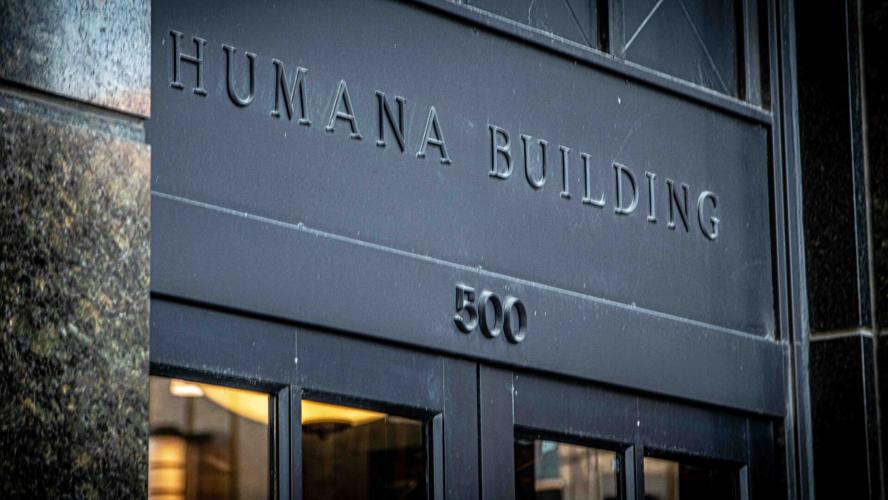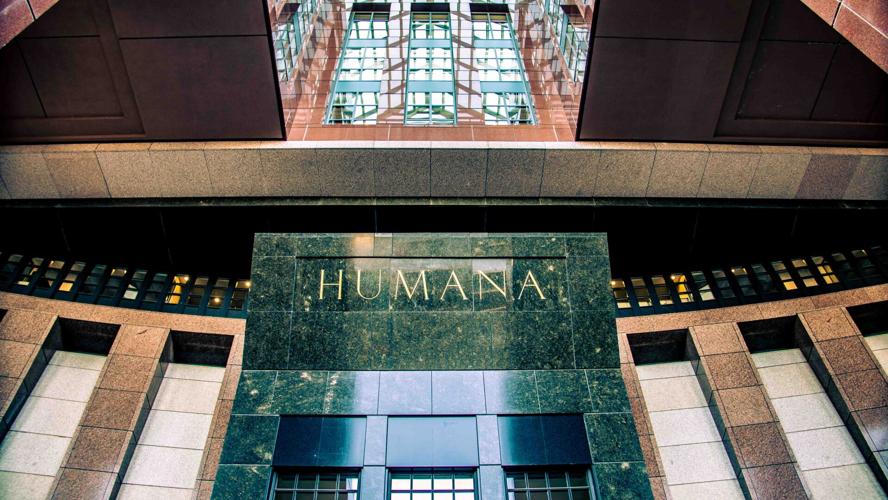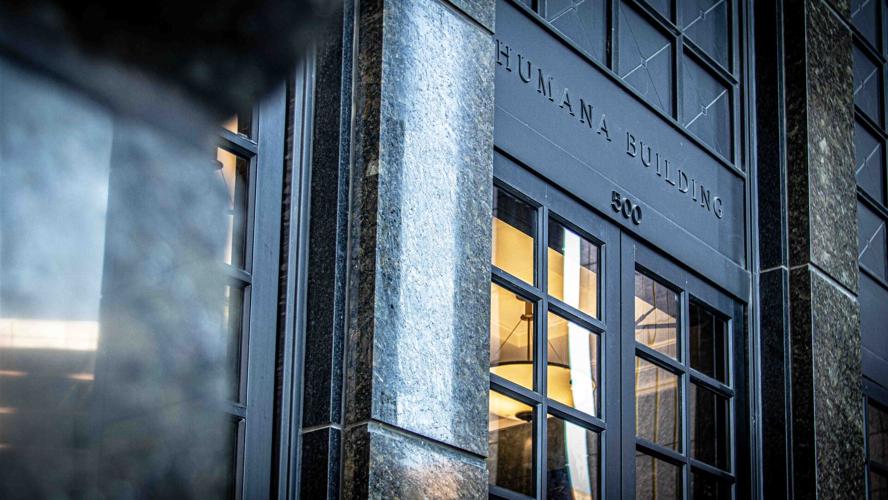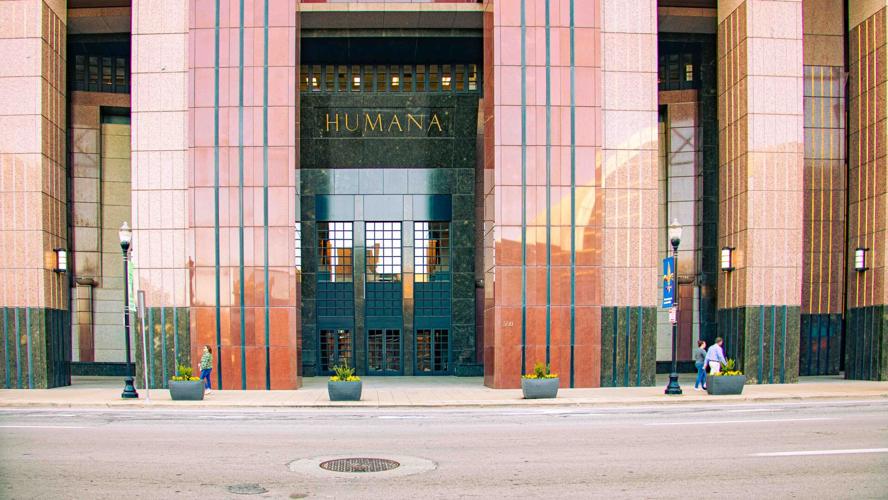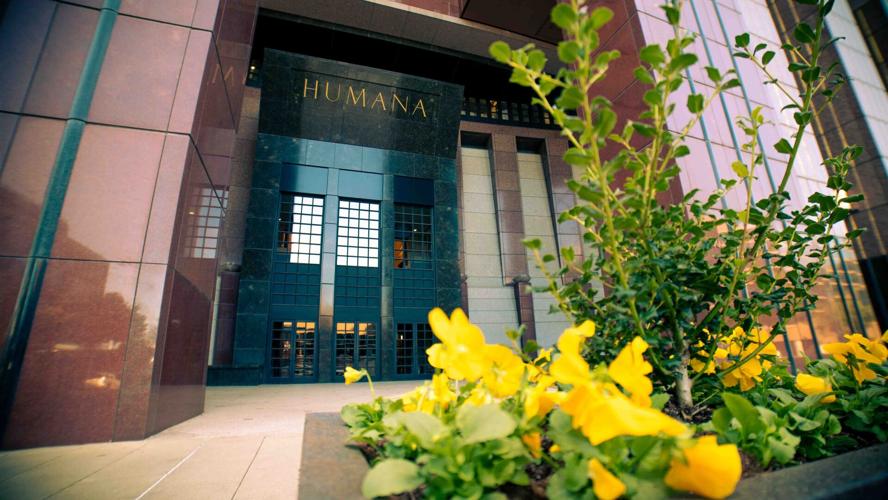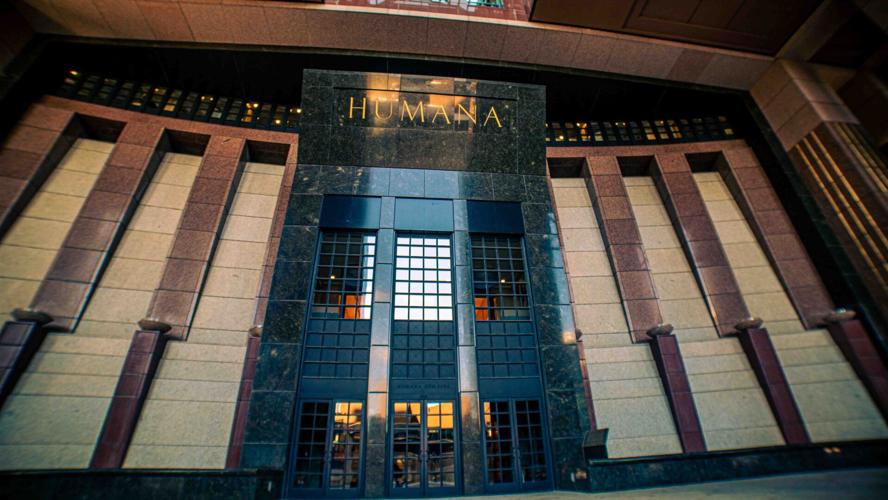LOUISVILLE, Ky. (WDRB) -- When Andy Agwunobi left his job running the University of Connecticut's health system to become a top executive at Humana Inc. earlier this year, he told colleagues he would be getting a place in the Washington, D.C., area, where Humana maintains a satellite office frequented by top executives, according to company sources.
There was no mention of a need to be in Louisville, Humana's headquarters city.
The episode illustrates Louisville's increasingly tenuous connection to its biggest and most important corporate citizen, Humana, after the COVID-19 pandemic upended the corporate work environment, disrupting previously unquestioned customs and habits.
Humana, one of the top health insurers in the country, still maintains its biggest employment hub in Louisville, where it has "more than 10,000" workers. But Louisville no longer appears to be the center of gravity for Humana's executives, about half of whom are based elsewhere, including several who work out of an expensive "trophy" office space the company established in 2020 in the Washington area.
The fact that some top-level executives live elsewhere is nothing new at Humana. But before the pandemic, these C-suite executives were still regularly present at downtown's main Humana building for meetings and other business, according to sources. That is less frequently the case today.
Meanwhile, the company's embrace of remote and hybrid work for its broader workforce has greatly diminished its presence as the anchor employer of downtown Louisville, which continues to struggle with historically high office vacancies.
In recent years, Humana has vacated almost all of its rented office space in the central business district. It has so much surplus office furniture that it's looking for nonprofits to take donations instead of sending it to landfills, an executive told a Louisville group last month. The company even donated a nine-story office building to the University of Louisville earlier this year.
All this comes as Humana, the 40th largest corporation on the Fortune 500 list, undergoes a seismic reorganization aimed at shoring up its main insurance business and accelerating a years-long effort to become a full-service health care giant that also treats patients in addition to insuring them.
For its part, Humana says it's still fully committed to Louisville, where it was founded as a nursing home operator 61 years ago before evolving into a hospital company and, later, into an insurer.
It's not the first time the company's future has seemed uncertain. But for one federal judge's decision in 2017, Humana would today be a mere division of Aetna, a Connecticut-based rival insurer that struck a deal in 2015 to purchase Humana. The merger fell apart when the judge ruled it anti-competitive, and Aetna was later gobbled up by CVS Health.
The narrowly averted sale of the company would likely have meant job consolidations, especially for higher paying corporate roles in Louisville.
Still, five years after Humana resolved to go-it-alone, some see the company going the way of Yum! Brands Inc. and Papa John's International: companies that remain nominally headquartered in Louisville but whose top executives and jobs are now in larger, faster-growing metro areas.
"It doesn't feel like it's a Louisville company anymore," one former Humana executive said.
This story is based on interviews with several current and recently departed Humana executives as well as others with knowledge of the company's internal dynamics, all of whom insisted on anonymity for fear of breaking company protocol in speaking to the media.
Humana declined to make anyone available for an interview.
WDRB News last month shared with the company a list of facts it planned to report for this story, but Humana did not specifically respond to the list. Instead, it sent a general statement reiterating its commitment to Louisville despite evolving workforce needs and touting its local philanthropy.
"Even as we've grown our business and expanded our workforce of 65,000 employees across the country, our support for Louisville has not diminished," the company said. You can read Humana's entire statement here.
Myles Shaver, a University of Minnesota management professor who studies the dynamics of corporate headquarters, said the pandemic prompted companies to reevaluate previously unchallenged habits, from the location of business to the importance of in-office work. That's likely the case for Humana as well, he said.
"We've gone through this big thing, and it sort of breaks the inertia of, 'Well, we've always been in Louisville,'" Shaver said. "And then somebody sort of questions, 'Well, if we're not going back to the office in general and we have to meet, why do we have to meet in Louisville?'"
CEO sells Louisville home in private transaction

Humana CEO Bruce Broussard talks about the strength of Humana's late co-founder David A. Jones, Sr., pictured behind him, during an event honoring the late Jones, who died in 2019. Dec. 11, 2019 (Matt Stone of Louisville Courier-Journal via pool)
Bruce Broussard, Humana's CEO since 2013, was always loosely connected to Louisville and a frequent traveler. But he was more present in the city earlier in his tenure, according to company sources. The pandemic marked a turning point, they say.
In August 2020, as nearly all Humana employees were working remotely amid the pandemic, Broussard and his wife, Janine, transferred ownership of their Louisville condominium unit.
The Broussards owned a $1 million unit in the exclusive Park Grande building near Cherokee Park since 2012, when Broussard had just joined Humana as the CEO-in-waiting and was shuffling between Louisville and Houston, where he and his four-person family had lived before he accepted the job.
On paper, the 2020 transfer merely moved the condominium unit from the Broussards' personal ownership to that of a limited liability company Broussard also controlled. No money changed hands.
But the transfer turned out to be the first step in an actual sale of the condo to an unaffiliated buyer — one that took place out of public view. The Broussards sold their interest in the LLC that owns the condo, according to a source with knowledge of the private transaction.
The vast majority of residential real estate is bought and sold directly by individuals, but wealthy people sometimes use limited liability companies or other legal entities for confidentiality. Humana would not disclose whether Broussard still maintains a Louisville residence. The company said it would not comment on the personal residence of any employee.
About the same time the Broussards sold their Louisville condo, Humana finished work on a new "trophy" office space for "executive leadership" in a high-rise building in the Rosslyn neighborhood of Arlington, Virginia, just across the Potomac River from the nation's capital.
In May 2019, a trust in the name of Broussard's wife, Janine, purchased a $4.4 million home in the ritzy Kalorama neighborhood of Washington, where former President Barack Obama, Ivanka Trump and Jared Kushner, and Amazon CEO Jeff Bezos have had homes, according to public real estate records.
The Broussards also have a home in Florida for which they have a homestead exemption, according to public records, indicating that they claim residency in the sunshine state, which does not have a personal income tax.
Humana's one-floor office in the Washington area represents a tiny fraction of its presence in Louisville, and no one close to the company knew of any plan to move its headquarters.
Humana, for its part, noted that Washington is the location of its largest customer: the federal government. Most of Humana's revenue comes from premiums paid by the government to cover seniors who get their Medicare benefits through Humana in the private program called Medicare Advantage.
Washington is "an important source of talent and healthcare expertise that Humana must continue to attract," Humana said.
"This makes good business sense and in no way diminishes our commitment to Louisville," the company said in the statement. "When we are successful across the country, our local Louisville community wins with further job creation and long-term economic stability."
Company insiders see the Washington office and Humana's largely location-agnostic approach as an inevitable consequence of its climb up the Fortune 500. In other words, the company can't afford to limit itself to executives who are willing to move to any particular place, such as Louisville.
Shaver, the Minnesota management professor, said even before the pandemic and the rise of virtual work, "There's been pressure on smaller metropolitan areas: Can they really attract and keep the talent that they need" to sustain a large company's home office?
At the same time, Shaver said Louisville may be reassured by the fact that plenty of companies maintain "hidden headquarters," places that keep the lion's share of corporate jobs and are integral to the functioning of the company, even if the most senior leaders are based elsewhere.
In 2014, Minneapolis-based medical device giant Medtronic became an Irish-based company in a tax-driven merger. But Minneapolis is still "crawling full of Medtronic people," Shaver said. "The formal headquarters moved, but a bulk of that workforce that really runs things and has the spillovers for the community, they never left."
Paul Coomes, a retired University of Louisville economics professor who has studied Humana's impact on Louisville, said it's also important for communities to have top corporate leaders personally invested in their future. He cited the work of the family of late Humana co-founder David Jones Sr. in spearheading the 21st Century Parks project — now known as the Parklands of Floyds Fork — in eastern Jefferson County.
"You don't get those kind of cultural, social assets — generally, anyway — through rank-and-file wage and salary workers," he said. "You get it through the investors and the founders of the companies that over decades accumulate a lot of wealth and then plow back into the communities that they live in."
Reduced footprint downtown
Humana has traditionally been the biggest office tenant in downtown Louisville as the company needed more space for workers than it could accommodate in its own buildings, such as the iconic Humana tower at 5th and Main streets and the Waterside building at 101 E. Main St.
But the company began ceding its leased space in the years leading up to the pandemic, giving up several floors in PNC Tower and in Aegon Center.
Today, Humana is nearing the end of its tenure at Waterfront Plaza, where the company once rented more than 500,000 square feet of the 800,000 square feet available across three office towers in the complex. Humana once occupied almost all of Waterfront Plaza's 20-floor east tower.
Scott Shoenberger, CEO of the Al J. Schneider Co., which owns Waterfront Plaza, told WDRB last month that the landlord appreciated Humana promptly paying rent for space they were not using all through the pandemic. But the Schneider Co. had hoped to retain Humana as a long-term tenant, he said.
"Obviously, their office dynamics have changed. ... It's unfortunate and it is disappointing," he said. "Vibrancy is really critical to the health of any urban environment — any downtown."
While some of the former Humana space has been absorbed by new tenants, it will "take some time" to reuse all of it, and the Schneider Co. is "looking at strategic options" for the office buildings, Shoenberger said.
Humana's reduced presence has contributed to a glut of empty office space in Louisville's downtown, a trend that began before the pandemic and accelerated in 2020. Other factors include traditional tenants such as banks and law firms doing more work remotely and needing fewer support staff, as well as job reductions due to corporate consolidation.
The vacancy rate for ready-to-occupy "Class A" office space in the Central Business District is almost 25%, according to real estate brokerage JLL. A rate of 8-10% is considered healthy.
Douglas Edwards, Humana's senior vice president for enterprise associate and business solutions, told a Louisville audience last month that Humana has "embraced" remote and hybrid work, which saves employees the time and stress of commuting and reduces the company's environmental impact.
"We've said, 'Hey, look, during the pandemic, a lot has changed,'" Edwards told the Louisville Sustainability Council during a virtual forum. "And now that the pandemic has waned and things are starting to get back to normal, we don't want necessarily to take away all the good things that came with us being able to work differently."
Remote and hybrid work is "something that we're excited about and something we'll continue to lean into in the months ahead," he said.
In June, Humana donated a nine-story office building at 515 W. Market St. to the University of Louisville for its new Health Equity Innovation Hub, which Edwards said shows the company's commitment to its hometown.
"Even though we're exiting space, we're also allowing and creating opportunities for downtown Louisville to continue to be a strong and vibrant central hub within the broader metro area," he told the Sustainability Council.
While it outfitted the Washington office during the pandemic, Humana also spared no expense in renovating its main two employment hubs in Louisville, the Humana Tower and the Waterside building, adding amenities meant to attract employees back to the office and to accommodate the new hybrid style of working. The company welcomed employees back to in-office work in March.
But absent any directives from the company, many employees are staying remote, and the buildings are noticeably less occupied than before the pandemic, employees say.
The untethering of professional jobs from location allows metro areas opportunities to gain workers even if their employers have no local presence. But it also can reduce the concentration of jobs in traditional company hubs.
In its statement for this story, Humana said it employs "more than 10,000" people in the Louisville area, including downtown-based workers, home workers and those who have hybrid arrangements.
That appears to be fewer Louisville workers than the company has had in the recent past, though Humana would not comment on discrepancies in various estimates of its Louisville workforce in recent years.
In 2021, a company spokeswoman said 12,000 was an accurate estimate of the company's local workforce. It is listed as 11,243 in Louisville Business First's annual list of large employers published in July, down from 12,526 in 2021.
In June, Edwards told WDRB News that the company's Louisville-area employment was 9,000-10,000 before the pandemic and the figure is "smaller now," though he did not have the information readily at hand.
In recent years, Edwards has served as the public face of Humana's Louisville presence, serving on the board of the Downtown Development Corp. and as co-chair of the steering committee of the Downtown Revitalization Team, a group Mayor Greg Fischer appointed in 2021 to lead the central city's recovery from the pandemic.
But, in an illustration of Humana's location-agnostic approach, Edwards and his wife sold their Louisville home in July and moved to Charlotte, North Carolina.
Pressure to grow
Humana's smaller office footprint not only reduces its carbon footprint but likely helps with another immediate company goal: cutting costs.
Humana's business has grown steadily over the last decade, buoyed by the rising tide of seniors aging into its main product, Medicare Advantage. The company is expected to eclipse $100 billion in annual revenue in the next few years and its value in the stock market has doubled since the ill-fated Aetna deal, to about $70 billion.
But in January, the company surprised investors by revealing weaker-than-expected growth in its Medicare business. More insurers are piling into Medicare Advantage, the fastest-growing area of health insurance, challenging Humana's position as the second-biggest player in the market behind United Healthcare.
Humana responded by launching a "value creation" plan aimed at saving $1 billion in various ways and channeling the savings into enhanced benefits for its Medicare plans offered in 2023. The company has promised Wall Street analysts that it will return to the rate of growth of the overall industry.
The annual period when seniors chose their Medicare plans and companies scramble to keep their members and add new ones started Oct. 15 and runs through Dec. 7.
While it seeks to shore up its bread-and-butter business, Humana also is accelerating a years-long effort to get back to its roots as a health care provider in addition to an insurer. Under a new brand called "CenterWell," the company operates hundreds of primary care clinics and oversees thousands of home-health workers, all to cater to its older Medicare population and to share in the savings that would result from improving their health and keeping them out of the hospital.
As it pursues the "value creation" plan, Humana is simplifying is administrative structure and reducing the company to two segments: insurance services and CenterWell. The company has said it aims to name an executive to head the insurance division by the end of the year.
The administrative shuffling has led to several layoffs and departures throughout the executive ranks and in several locations. Humana announced earlier this year that retail president Alan Wheatley, one of its longest-tenured Louisville-based executives and an architect of the company's Medicare Advantage business, would depart at the end of 2023.
The company's Washington-based chief medical officer, William Shrank, announced his departure in August.
Wall Street analysts see Humana's move to channel spending from administrative overhead to its core Medicare product as paying off soon. In a note to clients in September, Morgan Stanley analysts said Humana will offer "one of the most attractive" Medicare plans in the industry.
Deutsche Bank analysts upgraded their outlook on Humana last week.
"(We) anticipate Humana will come back strong in 2023 after stumbling in 2022," the bank said in a research note.




